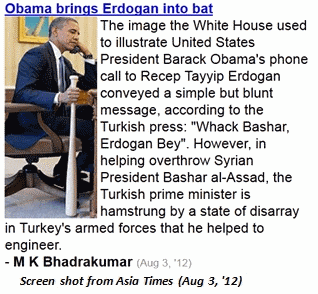| « Saving the Post Office: Letter Carriers Consider Bringing Back Banking Services | Paul Ryan's Socially Destructive Agenda » |
What if the Empire Project Fails in Syria?
By Michael Collins

Al Jazeera's weekend coverage of the battle for Aleppo, Syria reveals a major obstacle for the United States-NATO Empire Project. Hardly anyone in Aleppo seems to be joining up to fight with the rebels.
Syrian rebels get limited support in Aleppo, Al Jazeera, August 11
Reporter Anita McNaught: "[The rebels] know they have to win if the revolution is to succeed but Aleppo was slow to demonstrate any widespread support for the opposition." The reticence was due to fear of Syria's intelligence service a local claimed.
McNaught followed up: "Why now, when the Free Syrian Army was so quickly consolidating its hold, were its ranks not being swelled by volunteers from the city?"
One of the rebels (gesturing in image) responded: "They are afraid of the situation now. It's new to them. It's not like the countryside all around here which has had time to get used to the fighting." Trauma requires practice.
Al Jazeera is owned by the government of Qatar. Qatar partnered with NATO in Libya by providing troops on the ground and cash to the Libya rebels. The built in bias gives credibility to the claim of tepid local support. Like the people of Damascus who also kept their distance from rebels, Syrians in Aleppo are not consumed by anti-regime passion. That may have something to do with public polling showing that "most Syrians are in favour of Bashar al-Assad remaining as president."
What kind of revolution is this? Fighters from the countryside plus foreign fighters including al Qaeda move into the nation's largest city, attack police and government security installations inspiring … nothing much. The response of citizens both cities show that this is more an attack on cities rather than a broad based revolution.
There are a number of ways the revolution can succeed. However, success will be meaningless if the cause can't even inspire noticeable support from citizens in the two largest cities.
Over time, the ruling Ba'ath party of Bashar al-Assad relied on strong support from rural areas and the military. City dwellers were less inclined to support the regime, particularly in Aleppo. The rebels have not inspired much support in an area where support was expected. Where will they find it?

Turkey is the designated U.S.-NATO proxy. The Asia Times reported a conversation between President Obama and Turkey's President Erdogan in which Obama urged Turkey to send al-Assad on a permanent vacation. However, Turkey is experiencing some immediate blowback from its alliance with the West.
Long term hostilities between the Turkish state and its huge Kurdish population (nearly 20%) have been inflamed by the Syrian conflict. The Kurdish military arm, the PKK (Kurdistan Workers’ Party), recently set up a base in Iraq. The PKK launched attacks on Turkish officials and facilities in the Kurdish region.
This is President Recep Erdoğan's worst nightmare. He's set up his Foreign Minister as the fall guy if things go terribly wrong for Turkey (e.g., Syria survives as a viable state, a robust conflict with the Kurds).
There are few voices out there predicting that the Syrian government will survive the rebel assault. But the rebels can't find any open support in an area that should be sympathetic during the critical battle (Aleppo). Therefore, it is reasonable to ask: what happens if the enterprise falls on its face?
The United States and NATO would have to question the viability of its Libyan formula for regime change.
1. Take advantage of a political clash between a used up/undesirable leader and some internal faction (the rebels).
2. Covertly arm and otherwise assist the rebels;
3. Get a UN resolution decrying human rights violations based on evidence from an NGO aligned with the rebels;
4. Overtly arm and otherwise assist the rebels;
5. Win the battle for the rebels.
The steps must be followed in sequence. The current effort in Syria has stalled on step three.
This gives the Obama administration an opportunity. It can stop interfering with a sovereign state that poses no imminent threat to the United States and refocus its time and efforts on the people who are sinking in a very real economic depression.
END
This article may be reposted with attribution of authorship and a link to this article.


